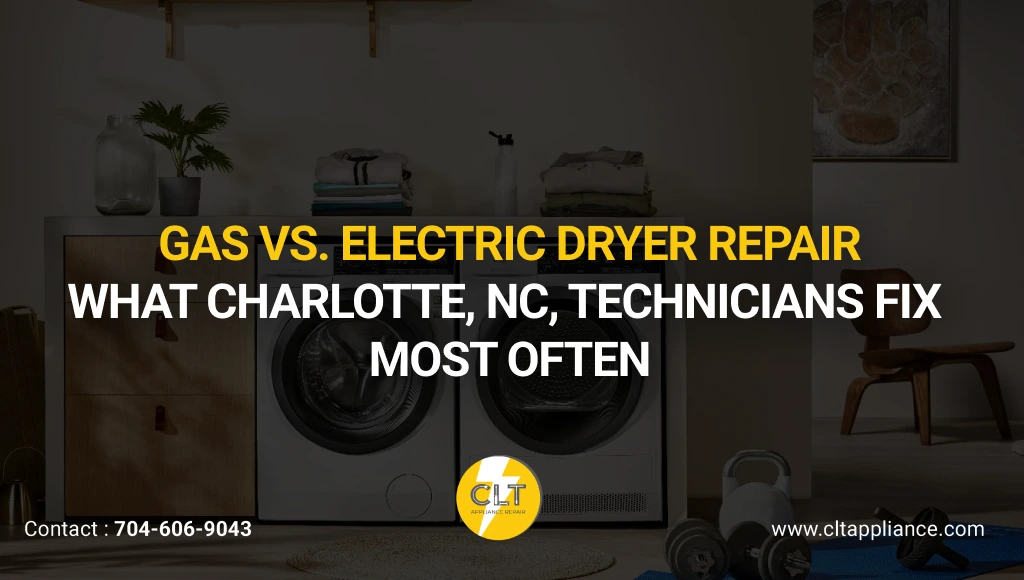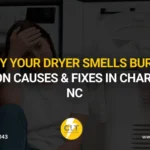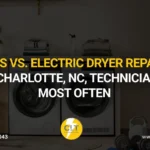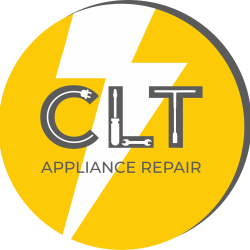Your dryer stops heating, makes strange noises, or won’t start at all. Before you panic about buying a new one, understand that most dryer problems are actually fixable. Gas and electric dryers break down differently because they heat clothes using totally different systems. Gas dryers burn natural gas or propane to make heat, while electric dryers use metal coils that get hot from electricity. Charlotte NC dryer repair technicians see clear patterns in what breaks most often for each type. Knowing these common issues helps you spot problems early, understand repair costs, and decide whether to fix or replace your appliance.
CLT Appliance Repair handles both gas and electric dryer problems quickly, getting your laundry routine back on track with same-day appointments available.
What’s the Difference Between Gas and Electric Dryer Repairs?
Gas and electric dryers use completely different heating systems, which means they break in different ways and need different fixes. Gas dryers burn natural gas or propane to make heat, while electric dryers use electrical heating coils. This basic difference determines which parts fail most often and what Charlotte technicians spend their time fixing.
Key Differences in Operation and Components
Gas and electric dryers heat your clothes differently, so they have different parts that can break. Gas dryers hook up to your home’s natural gas or propane line. When you start a cycle, a part called the igniter glows red-hot to light the gas. Once the gas lights, flames heat the air. That hot air blows through the drum to dry your clothes.
Special gas dryer parts include:
- Igniter: Glows to light the gas
- Gas valve coils: Control how much gas flows
- Flame sensor: Checks that the flame is burning safely
- Burner assembly: Where the gas burns to make heat
- Thermal fuse: Shuts everything off if it gets too hot
How electric dryers work
Electric dryers plug into a special 240-volt outlet (bigger than regular outlets). Electricity runs through heating coils, making them glow red-hot like a toaster. Air blows across these hot coils, heats up, then flows through the drum.
Special electric dryer parts include:
- Heating element: Metal coils that heat up from electricity
- Thermostats: Keep track of temperature
- Thermal cutoff fuse: A safety switch that stops heating if things get dangerous
- High-limit thermostat: Another safety switch for overheating
Both types share some parts like the drum, motor, belt, pulleys, bearings, fan, and lint filter.
Most Common Gas Dryer Repairs in Charlotte, NC
Gas dryers have specific parts that break more often than others, creating predictable patterns for what local technicians fix.
1. Igniter and Flame Sensor Problems
Igniter failures are the number one gas dryer repair in Charlotte, NC. The igniter is a fragile ceramic piece that glows orange-hot every time you dry clothes. After a few years of heating up and cooling down, it gets weak and eventually stops glowing hot enough to light the gas. When the igniter dies, your dryer runs but makes no heat.
Signs your igniter is bad:
- The dryer tumbles, but the clothes stay cold and wet
- You can see the igniter glowing weakly or not at all
- You smell gas, but nothing lights (turn off the dryer right away!)
- Everything seems normal except there’s no heat
Igniters usually last 3-5 years, depending on how often you use your dryer. Replacing one is pretty affordable and takes a tech about 30-45 minutes.
Flame sensor issues
The flame sensor’s job is to detect whether the gas is actually lit. If this sensor fails, it can’t confirm the flame is burning, so the gas valve shuts off for safety, even though everything else works. Sometimes the sensor only gets dirty or rusty, stopping it from seeing the flame properly. Gas valve coils work with the flame sensor to control gas flow. When these coils fail, gas can’t get to the burner even when the igniter glows perfectly.
2. Gas Leaks and Safety Concerns
Gas dryer repairs need special safety attention that electric dryers don’t.
Detection and repair urgency
Gas leaks are rare but really serious. If you smell gas (smells like rotten eggs) near your dryer, shut off the gas supply valve right away and call a technician immediately. Never ignore gas smells or try fixing gas parts yourself. Technicians check gas connections, valves, and lines during every repair. Charlotte’s temperature swings can make gas fittings expand and contract, sometimes loosening connections over time.
3. Ventilation and Airflow Troubles
Both gas and electric dryers need good ventilation, but vent problems are extra dangerous with gas dryers.
Blocked vents create hazards
Lint-clogged vents block airflow, making dryers work harder and longer. For gas dryers, this creates two specific dangers beyond fire risk. First, poor airflow can cause incomplete burning that produces carbon monoxide. Second, extra heat buildup damages parts faster. Charlotte’s humid weather makes lint stick together and build up faster in vent systems. Charlotte NC dryer repair technicians recommend cleaning vents once a year to prevent problems.
Signs your vents need cleaning:
- Clothes take two or three cycles to dry
- Outside of the dryer gets super hot while running
- Burning smell when the dryer runs
- Lots of lint around the dryer area
- Laundry room feels unusually hot and steamy
Most Common Electric Dryer Repairs in Charlotte, NC
Electric dryers have different problem areas than gas dryers, mainly related to their electrical heating system.
1. Heating Element and Thermostat Failures
Heating elements burn out more than any other electric dryer part. The heating element is a coil of wire that gets red-hot from electricity. Over time, these coils develop weak spots and eventually break, just like an old light bulb. When the element breaks, the dryer runs normally but makes zero heat.
Heating elements fail faster when:
- Dryer vents are clogged, causing overheating
- Hard water minerals build up on the coils
- Power surges zap the element
- Normal wear happens after 8-10 years
Replacing a heating element costs less than a gas igniter because the part is simpler and doesn’t involve gas safety stuff.
Thermostat and thermal fuse problems
Thermostats control when heating turns on and off to keep the right temperature. When thermostats go bad, dryers either don’t heat enough, get too hot, or turn on and off randomly. Thermal fuses are one-time safety devices. If your dryer overheats past safe limits, the thermal fuse blows to prevent fires. Once it blows, you have to replace it, as it won’t reset. A blown thermal fuse usually means another problem, like clogged vents causes overheating.
2. Electrical and Power Issues
Electric dryers use a lot of power, which creates specific electrical problems. Electric dryers use 240-volt circuits with more power than most home appliances. This heavy power use creates several common problems:
- Tripped circuit breakers from power surges or too much load
- Blown thermal fuses inside the dryer from overheating
- Bad start switches are stopping the dryer from turning on
- Loose or corroded electrical connections are causing an on-and-off operation
- Door switches are failing, so the dryer won’t start
Charlotte’s summer storms and power fluctuations can trip breakers or damage electrical parts. Many “broken” dryers only need the breaker reset at your electrical panel.
3. Drum and Motor Repairs
Mechanical parts fail in both gas and electric dryers in the same way. The drive belt wraps around the drum and motor pulley to spin the drum. Belts wear out over time, getting cracks and eventually breaking. When the belt breaks, the drum won’t turn even though the motor runs. Belt problems show up as:
- A thumping sound before it breaks completely
- The drum doesn’t turn, but the motor runs
- You can see cracks or damage on the belt
Support rollers and bearings hold the drum and let it spin smoothly. When these wear out, you hear squealing, grinding, or thumping noises. Bad bearings can make the drum stop turning or turn unevenly.
Now that you know what breaks most often in each dryer type, let’s look at what Charlotte repair techs actually deal with day to day.
Which Dryer Repairs are More Common for Charlotte Technicians?
Local repair patterns show interesting differences between gas and electric dryer service calls in the Charlotte area.
Local Trends in Repair Requests
Charlotte’s weather and housing types influence what dryer repair technicians see most.
Gas vs electric repair frequency
More Charlotte homes have electric dryers than gas dryers, so technicians naturally see more electric dryer repairs overall. However, gas dryer repairs often need more complex diagnosis and safety checks.
Typical service patterns look like:
- Electric dryers: More frequent simple fixes like heating elements and belts
- Gas dryers: Less frequent but more complicated repairs involving igniters and gas parts
- Both types: Regular maintenance calls for vent cleaning and checkups
Charlotte’s older neighborhoods often have gas dryer hookups from when gas was more popular. Newer neighborhoods usually have only electric dryer outlets, following national trends away from gas appliances.
Safety regulations for gas dryers
North Carolina requires proper permits and licensed technicians for gas appliance repairs. Gas dryer repairs must follow safety codes that don’t apply to electric dryers. Technicians have to check ventilation, look for gas leaks, and make sure all safety features work correctly. Charlotte NC dryer repair pros carry special equipment for gas work, including gas leak detectors, pressure testing tools, and carbon monoxide monitors.
Factors Affecting Repair Complexity and Cost
Several things determine whether your dryer repair will be simple and cheap or complicated and expensive.
Diagnostic Challenges and Parts Access
A good diagnosis is really important for effective repairs, especially with gas dryers.
Specialized expertise needed
Gas dryer repairs need technicians with gas appliance certification. They have to understand combustion, gas flow, and safety systems beyond regular appliance knowledge. This specialization affects labor costs for gas dryer repairs. Electric dryer repairs are usually more straightforward. Most technicians can diagnose and fix electric dryer problems without special gas training.
Parts and cost differences
Gas dryers use specialized parts like igniters, gas valve coils, and flame sensors, which are generally more complex than those in electric models. Electric dryers, however, can also have costly components such as control boards or sensors. Overall, gas dryer repairs often require more expertise and safety checks, while electric dryer repairs are usually simpler and faster to complete.
Repair vs replacement decision
Think about replacing instead of repairing when:
- Your dryer is over 10 years old, with a major part failure
- Repair costs more than half what a new dryer costs
- Multiple parts need replacing
- You keep needing frequent repairs
- New energy-efficient models would save you money
Most single-part repairs make sense, no matter how old your dryer is. Replace rather than repair when facing multiple expensive fixes at once.
Final Call
Gas and electric dryers fail in predictable ways based on how they heat. Gas dryers most commonly need igniter replacements and flame sensor repairs, while electric dryers usually need heating element and thermostat fixes. Both types get mechanical problems like broken belts and worn bearings. Charlotte’s humid weather speeds up lint buildup, affecting both dryer types. Gas dryer repairs need specialized technicians because of safety concerns, and usually cost more than electric dryer repairs. Understanding these common issues helps you spot problems early and make smart decisions about repairing versus replacing.
Dryer problems mess up your household routine, leaving laundry piling up and everyone frustrated. CLT Appliance Repair specializes in both gas and electric dryer repairs throughout Charlotte, NC, offering same-day service that fits your schedule.
Don’t let a broken dryer mess up your routine. Professional help is only one call away.
FAQs
What is the most common repair for gas dryers in Charlotte, NC?
Igniter replacement is the top repair. Gas dryer igniters fail most often in Charlotte, stopping heating. The ceramic igniter gets weak after years of heating cycles and stops glowing hot enough to light the gas.
What are the signs of a dangerous gas dryer issue?
Watch for specific warning signs. Gas smell near the dryer, yellow or flickering flames instead of blue, too much heat buildup, or carbon monoxide detector alarms need immediate tech attention.
Can homeowners DIY dryer repairs, or should they call a technician?
It depends on the dryer type and the problem. Never DIY gas dryer repairs; call professionals for safety. Simple electric dryer fixes like cleaning vents or changing belts are DIY-friendly with proper instructions.
How do dryer vent issues contribute to repair needs in Charlotte, NC?
Vent problems cause multiple repair issues. Charlotte’s humidity makes lint build up faster, blocking airflow. Clogged vents make dryers overheat, causing thermal fuse failure, heating element damage, and motor problems.
Author

- John Bennett
- John Bennett is a seasoned appliance repair specialist at CLT Appliance Repair, where he brings over a decade of technical expertise and a strong commitment to customer satisfaction. With a background in electrical and mechanical systems, John has built a reputation for reliable, efficient, and honest repair services across a wide range of household appliances-including refrigerators, washing machines, ovens, and more.
Latest entries
News11/19/2025Why Your Dryer Smells Burnt: Common Causes & Fixes in Charlotte, NC
News11/19/2025Preventive Maintenance Tips to Extend Your Dryer’s Life in Charlotte
News11/18/2025Gas vs. Electric Dryer Repair: What Charlotte, NC, Technicians Fix Most Often
News11/18/2025Top 5 Signs Your Dryer Needs Professional Repair in Charlotte, NC








